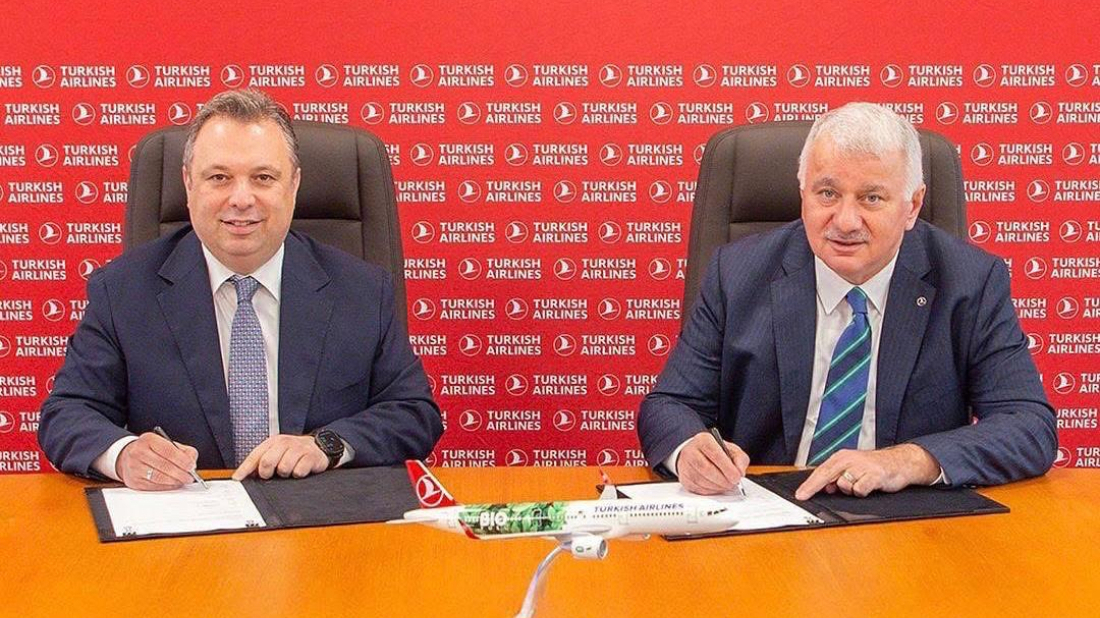At least 25 National Guard killed after Mexican drug lord’s death
At least 25 members of Mexico's National Guard have died during a wave of violence in the state of Jalisco after the killing of a drug lord, the count...

SOCAR Türkiye, a subsidiary of the State Oil Company of the Azerbaijani Republic, has announced about a cooperation with Turkish Airlines in the field of sustainable aviation fuel. The move is aimed at complying with Türkiye's goal of reducing aviation emissions by 5% by 2030.
On Wednesday, SOCAR Türkiye CEO Elchin Ibadov and Turkish Airlines CEO Bilal Ekşi signed a Memorandum of Understanding (MoU) to expand their existing partnership in conventional aviation fuel supply to include sustainable aviation fuel (SAF).
The cooperation will also lay the f oundation for implementing larger-scale projects aimed at achieving regional sustainable development goals, SOCAR Türkiye said in its statement.
“We are proud to implement our sustainability vision, which we outlined at COP29, hosted by Azerbaijan last year, with real projects in Türkiye. Thanks to the high production capacity of our group company STAR Refinery, advanced processing technologies, modern operations focused on digitalization and our R&D efforts, we have a strong and competitive infrastructure in SAF production,” the statement said.
Turkey set mandates for airlines and jet fuel suppliers to boost uptake of sustainable aviation fuel, with a goal of reducing aviation emissions by 5% by 2030, its civil aviation authority said on its website.
The move is aimed at complying with the U.N. International Civil Aviation Organization's emission reduction scheme that will become mandatory in 2027.
The new rules will oblige airlines to use sufficient SAF in international flights involving Turkey to meet the 5% emissions reduction goal. They will also require jet fuel suppliers in the country to procure SAF to meet that target, and domestic oil refiners Tupras and SOCAR to start producing SAFs.
SAF is an alternative fuel made from non-petroleum feedstocks that reduces emissions from air transportation. It can be produced from non-petroleum-based renewable feedstocks including, the food and yard waste portion of municipal solid waste, woody biomass, fats/greases/oils, and other feedstocks. Unlike conventional jet fuel, SAF in its pure form reduces carbon emissions 80%. SAF can be blended with conventional aviation fuel in proportions of up to 50%.
A seven-month-old Japanese macaque has drawn international attention after forming an unusual bond with a stuffed orangutan toy after being rejected by its mother.
Divers have recovered the bodies of seven Chinese tourists and a Russian driver after their minibus broke through the ice of on Lake Baikal in Russia, authorities said.
Pakistan said it carried out cross-border strikes on militant targets inside Afghanistan after blaming a series of recent suicide bombings, including attacks during the holy month of Ramadan, on fighters it said were operating from Afghan territory.
President Donald Trump said on Saturday (21 February) that he will raise temporary tariffs on nearly all U.S. imports from 10% to 15%, the maximum allowed under the law, after the Supreme Court struck down his previous tariff program.
Iran announced on Saturday (21 February) that it has designated the naval and air forces of European Union member states as “terrorist entities” in a reciprocal move after the EU blacklisted the Islamic Revolutionary Guard Corps (IRGC).
The administration of U.S. President Donald Trump on Thursday (12 February) announced the repeal of a scientific finding that greenhouse gas emissions endanger human health, and eliminated federal tailpipe emissions standards for cars and trucks.
Tropical Cyclone Gezani has killed at least 31 people and left four others missing after tearing through eastern Madagascar, the government said on Wednesday, with the island nation’s second-largest city bearing the brunt of the destruction.
Rivers and reservoirs across Spain and Portugal were on the verge of overflowing on Wednesday as a new weather front pounded the Iberian peninsula, compounding damage from last week's Storm Kristin.
Morocco has evacuated more than 100,000 people from four provinces after heavy rainfall triggered flash floods across several northern regions, the Interior Ministry said on Wednesday.
Greenland registered its warmest January on record, sharpening concerns over how fast-rising Arctic temperatures are reshaping core parts of the island’s economy.
You can download the AnewZ application from Play Store and the App Store.

What is your opinion on this topic?
Leave the first comment